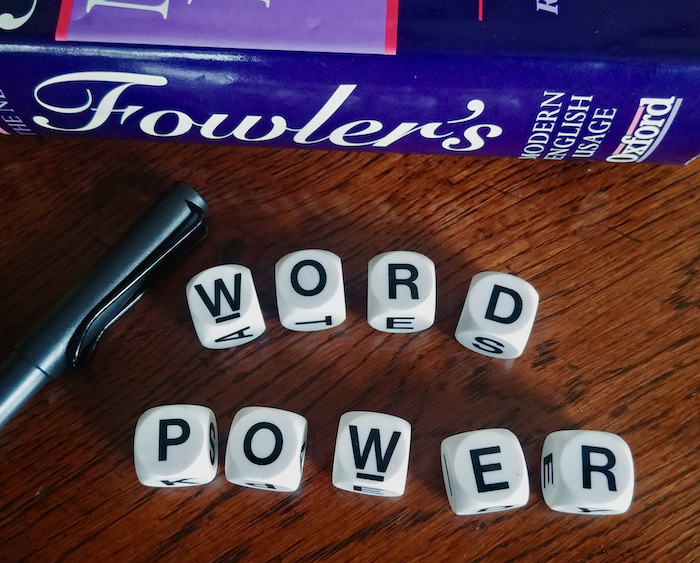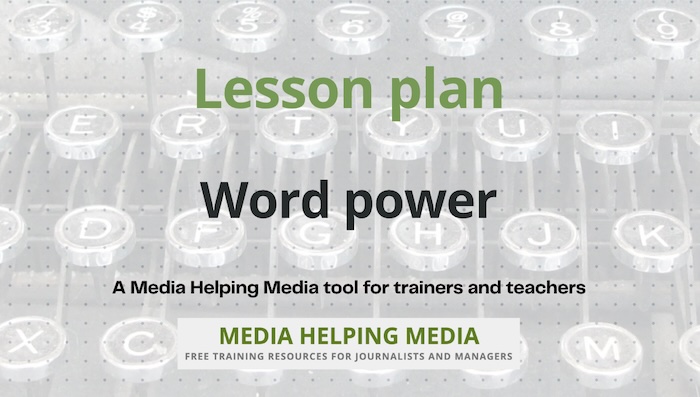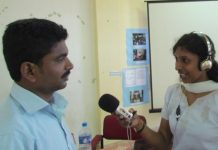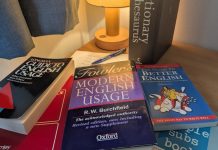
Words are the essential tools of journalism. They convey meaning and help the audience understand the issues we are covering. So they need to be used properly.
This article is taken from The News Manual’s Chapter 11: Language & Style – Words and is republished with permission. We have another article on the site ‘Using the right words‘ which covers similar ground.
Spelling
Languages are in a constant state of change. English, as the world’s most widely used language, changes faster than most. Spelling is an area in which this change is most noticeable. There are two standards in spelling – Commonwealth English and American English. Which spelling you choose will depend on usage in your country. Most media organisations decide on a particular alternative and stick to it. Here are some examples of alternative spellings:
| COMMONWEALTH colour organise through defence jewellery |
AMERICAN color organize thru defense jewelry |
Jargon
Jargon is specialised language concerned with a particular subject, culture or profession. It is not usually found in the everyday speech of your ordinary reader or listener. Typical of jargon are such things as medical or technical terms, understood by small groups of specialists in their own fields. For example, a coronary thrombosis to a doctor is commonly called a heart attack by the layman. Computer scientists speak of accessing data when ordinary people talk about getting information.
There is an obvious need for such technical terms in context, such as the doctor’s surgery or the computer room. Unfortunately, jargon words tend to spill over into the media. This is partly because journalists want to impress readers or listeners by their knowledge and partly because journalists do not understand what they have been told. Bad journalists find it easier to pass on the problem to their audience by simply repeating the difficult words which they have been given and don’t understand. You should first ask the person concerned to explain what they mean in simpler terms.
This is especially obvious in reporting on government and the public service. Officials often hide behind their own jargon, using it as a wall to keep the public away from their secrets. A Papua New Guinea Minister for Minerals, speaking about foreign shareholders in a big mine, was quoted as saying:
“…they were invited to participate in the development of that mineral resource and they are obligated to honour their agreement to participate.”
Put into simple English, this means:
They agreed to take part in mining and must stick to that agreement.
Notice that we have had to take the sentence out of direct quotes. You cannot drastically alter the words a person says and leave your readers or listeners believing that they were a direct quote. It is much better to use reported speech that people can understand than use quotes which they cannot.
The message is clear. If you do not understand what you are writing, do not write it. If you have a good knowledge of language, you can translate jargon yourself. If you have any doubts, go back to the people who gave you the information and ask them: “What does it mean in plain English?”
Having said that, there are times when you have to use technical or otherwise difficult terms. In such cases, you should provide an explanation for your reader or listener. This need not be complicated. In the following example, we use the term de facto and explain it within the natural structure of the story:
The immigration service says it will no longer recognise de facto relationships in issuing visas.
Officials say that in future, they will only give joint entry permits to couples who are married.
Men and women living together in de facto relationships will have to apply separately.
Always try to explain abstract jargon in concrete terms; that is, translate ideas into what they mean in the day-to-day lives of your readers or listeners. This is important in areas such as economics and government. For example, a ten percent annual rate of inflation means for most people that the dollar in the pocket a year ago now buys only 90 cents-worth of goods. An increase in the basic tax rate means that workers will get less money in their pay packet.
Public servants often take ordinary words and alter their use, making them difficult for people to understand. For example, they talk about sighting a document when they really mean they saw it. To sight something usually means suddenly seeing it from a distance. To complicate matters further, there is also a verb to cite a document, which means to quote from it. To a radio listener, “sight” and “cite” both sound the same. There are numerous examples of misuse which you should avoid whenever possible.
The following is a list of jargon words and phrases. Alongside each there is an example of a good alternative:
| absence of accommodation adequate adjacent to affluent a great deal of ahead of schedule along the lines of anticipate approximately ascertain as of that time assistance at an early date attempt at that moment in time at the present time at this moment in time behind schedule beverage by means of cause injuries to commence, commencement compel concerning constructed of currently deceased demonstrate despite the fact that discontinue dispatched donate due to the fact that encounter eventuate exceedingly facilitate filled to capacity gained entrance to gathered together give approval to give consideration to give rise to hospitalised to implement in addition in advance of in attendance in consequence of inform in isolation initiate in light of the fact in many cases in order to inquire in regard to in spite of in spite of the fact that in the course of in the direction of in the event of in the vicinity of is suffering from made good their escape manufacture materialise measure up to meet with necessitate an objective on the occasion of on the part of participate passed away pay tribute to persons/personnel place under arrest to possess prior to proceed purchase regarding render assistance to residence shortfall in supply submitted his resignation subsequently sufficient sustained injuries take action on the issue terminate take into consideration transmit urban centres utilise valued at voice disapproval of was of the opinion that whole of with reference to with the exception of |
no housing or room enough near rich a lot of early like expect about find out then help soon try then now now late drink by/using injure start force about/on made of now dead show although stop sent give because meet happen very help full got in met approve consider cause put in hospital to do/ carry out also before there because of tell alone start because often to ask about despite although while towards in/if near has escaped make happen/appear fit/reach meet force/need an aim when by take part died thank/praise people/workers/staff arrest to have before go buy about help home shortage resigned later enough was hurt act end consider send cities or towns use worth object to thought/said all about except |
Unnecessary words
People frequently put in extra words or phrases which do not add to understanding. As a journalist you should judge which words help your reader or listener and which only make the sentence longer. For example, people write about waiting for a period of two years. The phrase a period of is unnecessary; you should simply say waiting for two years.
Another common fault, particularly in the spoken word, is to add adjectives or adverbs to nouns or verbs which should not have them. In grammar, this is called redundancy. It usually happens where the noun or verb is an absolute; that is, where something either is or is not, with no half measures. It is clearly wrong to describe a woman as very pregnant. A woman is either pregnant or she is not; there is a definite moment when she becomes pregnant. If the very is being used to indicate that she has been pregnant for several months, it is best to give exact details saying, for example, the woman is eight months pregnant.
It is equally wrong to describe a person as utterly dead. There is a moment at which life stops; people are either dead or they are alive, they cannot be slightly dead or rather dead. They may be nearing death, but that is a different and quite acceptable phrase.
The following is a list of unnecessary words and redundant phrases. Get rid of the words in italics:
| absolute perfection absolutely necessary accidentally stumble acute crisis adequate enough advance planning a distance of two metres all-time record a number of examples a period of two years appear on the scene ask the question assemble together at a later date attach together best ever blazing inferno broad daylight comment to the effect that completely untrue connect together continue in existence continue on co-operate together definite decision during the course of each and every entirely new estimated at about ever since exactly identical exactly the same as face up to few in number filter out follow after for a period of future prospect gather together general public honest truth |
hot water heater in a week‘s time joined together just recently last of all link together may possibly meet together merge together necessary requirement never at any time new beginning new innovation new record original source other alternative past history postpone until later promoted to the rank of quite empty quite unique raise up repeat again returned back share out sink down small in size still continue strangled to death temporarily suspended total extinction totally destroy totally unnecessary true facts unite together usual custom violent explosion whether or not widow of the late win out worst ever |
Clichés
These are phrases which have been used so often in such a variety of situations that they have lost most of their meaning and force. They become boring to regular readers or listeners and should be avoided.
Journalists in older English-speaking countries such as Britain and the United States are usually taught to avoid clichés. There are two problems facing young journalists in developing countries in the use of clichés. One is that clichés often depend on aspects of a culture specific to certain countries. To describe something which happens very slowly, a British person might say at a snail’s pace, whereas an American would say as slow as molasses in January (a reference to the way that sticky liquids like molasses are harder to pour in cold weather). The American cliché might not be understood by many British people, who call molasses treacle. It would be meaningless to people living south of the Equator, for whom January is a hot month – and for people in the tropics who have no experience of cold seasons.
Journalists should be able to recognise clichés which develop in the language of their own country. If, for example, everyone talks about things or people being as fat as a buffalo, this becomes a cliché. The good journalist will find an alternative which is more accurate or more lively.
The second problem with clichés is that phrases which have become boring in one country may seem fresh and powerful in another. Again, it is your responsibility as a journalist to recognise which phrases are fresh and meaningful, which are stale and meaningless.
We will give you a list of phrases which have become clichés in most of the developed English-speaking nations. It is for you to decide which are clichés in your country:
| a bee in his bonnet all walks of life all-out effort armed to the teeth as luck would have it at a loss for words bated breath beaming smile behind closed doors benefit of the doubt bigger and better bitter end blessing in disguise blunt instrument brutally murdered budding genius busy as a bee calm before the storm colourful scene conservative estimate crime wave crystal clear daring robbery dramatic new moves dull thud easy prey fateful day festive mood few and far between finishing touches flow like water foregone conclusion gruesome find hail of bullets hang in the balance head over heels hot pursuit ill-fated in full swing in the hot seat in the limelight in the nick of time |
innocent as a newborn baby in no uncertain terms laid to rest last but not least like two peas in a pod long arm of the law loomed on the horizon lucky few man hunt marked contrast more than meets the eye Mother Nature mystery surrounds nipped in the bud order out of chaos pool of blood proud father raced to the scene rags-to-riches red-blooded male sadder but wiser sea of faces second to none sigh of relief sign of the times silver lining smell a rat sparkling eyes steaming jungle storm of protest stormy session sweeping changes terror-stricken thick and fast tiny tots top-level meeting tower of strength vanish into thin air watery grave whirlwind tour white as a sheet widespread anxiety |
Troublesome words
A large number of words in the English language are misused. Often it is simply a matter of confusion between similar-sounding words. It is important that you use words correctly. For example, there is often confusion in radio and television between the word diseased (which means having a disease) and deceased (which means dead). In fact, the word deceased causes young reporters so many problems you should avoid using it altogether. Police reports often speak of the deceased when referring to a dead man or woman. A reporter who simply parroted a police statement about a fight between two men wrote the sentence:
The deceased went up to the accused and hit him over the head with a stick.
It is clearly nonsense to say that a dead man hit anybody over the head with a stick. Dead people do not do that. The sentence would have been much clearer if the reporter had used both men’s names.
The following is a list of words which frequently cause problems, especially through misuse:
- affect: is a verb meaning to have an influence on. Often confused with effect which is the noun. So we say: The girl’s headache affected her performance, but the noise had no effect on her.
- all right: is two words. Do not spell it alright.
- alternatives: a choice between two things. If there are more than two, use choices.
- among: used when there are more than two things. If there are two things, say between.
- anxious: means to be troubled or worried. It is sometimes wrongly used to mean eager.
- beside: means at the side of. Besides means in addition to.
- canvass: means to ask for something. Do not confuse it with canvas, which is a cloth.
- charge: there is often confusion between to charge with and to charge for. A person is charged with an offence (the man was charged with murder) People are charged for goods or services they receive (he was charged $20 for his ticket).
- chronic: means long-lasting. When talking about illness, it is often confused with acute, which means severe.
- continual: means happening lots of times. Do not confuse with continuous, which means happening all the time without a break.
- council: is a meeting. Counsel is advice. A councillor is an elected representative on a council. A counsellor is someone who gives advice. We also refer to lawyers in court cases as counsel, because they give legal advice.
- decimate: literally it means to kill one in ten. Today it is used to describe heavy casualties. It does not mean to destroy.
- disappeared: traditionally only ever used as an intransitive verb (i.e. without an object), as in “the rabbit disappeared”. Now in some versions of English it is used as a transitive verb (i.e. with an object, usually human) to mean to intentionally make someone disappear, as in “the regime disappeared hundreds of dissidents”, though this form is still unusual in British, Australian or American English.
- disinterested: means not being directly affected by the issue one way or the other. Do not confuse with uninterested, which means lacking any kind of interest.
hang: a criminal is hanged, clothes are hung. - immigrant: a person who comes into the country to live permanently. It is confused with …
- emigrant, who is a person who leaves his or her own country to live permanently in another country. An emigrant from one country becomes an immigrant into another.
- invaluable: means of too much value to be priced. It is often wrongly used to mean without value.
- less: confused with fewer. Less refers to quantity (less water, less flour, less fruit). Fewer refers to number (fewer boys, fewer coconuts).
- licence: in Commonwealth English, this is the noun. To license is the verb.
- literally: usually confused with figuratively. Literally means exact to the letter. If it happens literally, it happens exactly the way it is described. People speak of being “literally dead on my feet“. If they were, they would be dead.
- loan: is the noun. The verb is to lend.
- over: means above. When talking about numbers, use more than (there were more than 50 people in the hall).
- practice: is the noun. To practise is the verb.
- principal: means the main one or the first. We speak of the principal instalment or the school principal. It is often confused with principle, which is a moral guideline.
- Scots: these are people from Scotland, who are Scottish. Do not confuse it with the whisky called Scotch.
- stationary: is an adjective meaning standing still. It is confused with stationery, a noun meaning writing materials.
- treble: mean three times. Do not confuse with triple, which means three kinds. A treble chance gives you three chances of winning. A triple jump is an event involving three kinds of jumping action.
- Ukraine: is the name of the country, not the Ukraine, which was a label used by the former Soviet Union to imply it was a region rather than an independent state.
- whisky: Scotch whisky is spelled without an `e’. Irish and American whiskey is spelled with an `e’.
To summarise
- You must keep your language clear and simple so that your readers or listeners can understand.
- Check any spellings you are unsure of; spelling is important.
- Explain any new words whenever you use them.
- Avoid jargon, unnecessary words and clichés.
- If you do not understand a word you cannot expect your reader or listener to.
This module is taken from The News Manual’s Chapter 11: Language & Style – Words.
Related material
Those wanting to learn about the correct use of language should also read ‘Using the right words‘ which is also published on this site and includes more examples.

Lesson plan for trainers
If you are a trainer of journalists we have a free lesson plan: ‘Word power‘ which you are welcome to download and adapt for your own purposes.









